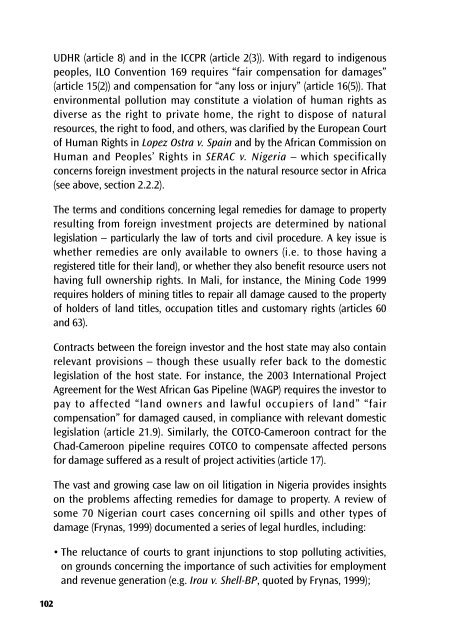Legal empowerment for local resource control
Legal empowerment for local resource control
Legal empowerment for local resource control
Create successful ePaper yourself
Turn your PDF publications into a flip-book with our unique Google optimized e-Paper software.
102<br />
UDHR (article 8) and in the ICCPR (article 2(3)). With regard to indigenous<br />
peoples, ILO Convention 169 requires “fair compensation <strong>for</strong> damages”<br />
(article 15(2)) and compensation <strong>for</strong> “any loss or injury” (article 16(5)). That<br />
environmental pollution may constitute a violation of human rights as<br />
diverse as the right to private home, the right to dispose of natural<br />
<strong>resource</strong>s, the right to food, and others, was clarified by the European Court<br />
of Human Rights in Lopez Ostra v. Spain and by the African Commission on<br />
Human and Peoples’ Rights in SERAC v. Nigeria – which specifically<br />
concerns <strong>for</strong>eign investment projects in the natural <strong>resource</strong> sector in Africa<br />
(see above, section 2.2.2).<br />
The terms and conditions concerning legal remedies <strong>for</strong> damage to property<br />
resulting from <strong>for</strong>eign investment projects are determined by national<br />
legislation – particularly the law of torts and civil procedure. A key issue is<br />
whether remedies are only available to owners (i.e. to those having a<br />
registered title <strong>for</strong> their land), or whether they also benefit <strong>resource</strong> users not<br />
having full ownership rights. In Mali, <strong>for</strong> instance, the Mining Code 1999<br />
requires holders of mining titles to repair all damage caused to the property<br />
of holders of land titles, occupation titles and customary rights (articles 60<br />
and 63).<br />
Contracts between the <strong>for</strong>eign investor and the host state may also contain<br />
relevant provisions – though these usually refer back to the domestic<br />
legislation of the host state. For instance, the 2003 International Project<br />
Agreement <strong>for</strong> the West African Gas Pipeline (WAGP) requires the investor to<br />
pay to affected “land owners and lawful occupiers of land” “fair<br />
compensation” <strong>for</strong> damaged caused, in compliance with relevant domestic<br />
legislation (article 21.9). Similarly, the COTCO-Cameroon contract <strong>for</strong> the<br />
Chad-Cameroon pipeline requires COTCO to compensate affected persons<br />
<strong>for</strong> damage suffered as a result of project activities (article 17).<br />
The vast and growing case law on oil litigation in Nigeria provides insights<br />
on the problems affecting remedies <strong>for</strong> damage to property. A review of<br />
some 70 Nigerian court cases concerning oil spills and other types of<br />
damage (Frynas, 1999) documented a series of legal hurdles, including:<br />
The reluctance of courts to grant injunctions to stop polluting activities,<br />
on grounds concerning the importance of such activities <strong>for</strong> employment<br />
and revenue generation (e.g. Irou v. Shell-BP, quoted by Frynas, 1999);

















